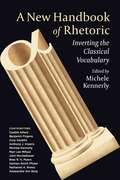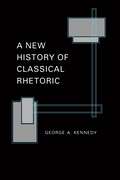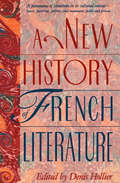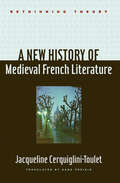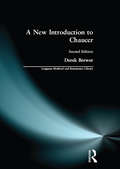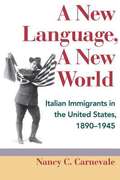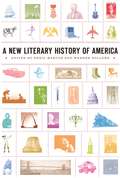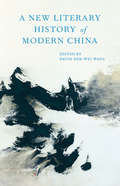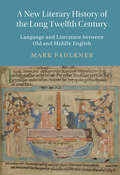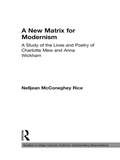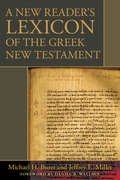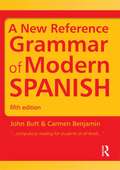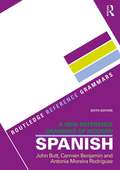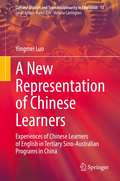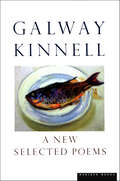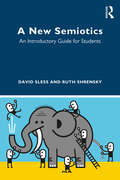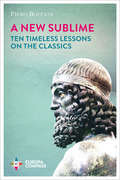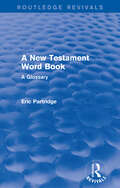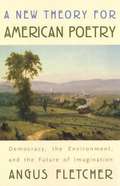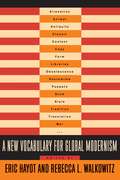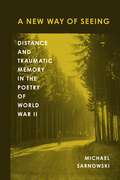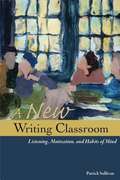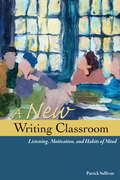- Table View
- List View
A New Handbook of Rhetoric: Inverting the Classical Vocabulary
by Michele KennerlyLike every discipline, Rhetorical Studies relies on a technical vocabulary to convey specialized concepts, but few disciplines rely so deeply on a set of terms developed so long ago. Pathos, kairos, doxa, topos—these and others originate from the so-called classical world, which has conferred on them excessive authority. Without jettisoning these rhetorical terms altogether, this handbook addresses critiques of their ongoing relevance, explanatory power, and exclusionary effects.A New Handbook of Rhetoric inverts the terms of classical rhetoric by applying to them the alpha privative, a prefix that expresses absence. Adding the prefix α- to more than a dozen of the most important terms in the field, the contributors to this volume build a new vocabulary for rhetorical inquiry. Essays on apathy, akairos, adoxa, and atopos, among others, explore long-standing disciplinary habits, reveal the denials and privileges inherent in traditional rhetorical inquiry, and theorize new problems and methods. Using this vocabulary in an analysis of current politics, media, and technology, the essays illuminate aspects of contemporary culture that traditional rhetorical theory often overlooks.Innovative and groundbreaking, A New Handbook of Rhetoric at once draws on and unsettles ancient Greek rhetorical terms, opening new avenues for studying values, norms, and phenomena often stymied by the tradition.In addition to the editor, the contributors include Caddie Alford, Benjamin Firgens, Cory Geraths, Anthony J. Irizarry, Mari Lee Mifsud, John Muckelbauer, Bess R. H. Myers, Damien Smith Pfister, Nathaniel A. Rivers, and Alessandra Von Burg.
A New History of Classical Rhetoric
by George A. KennedyGeorge Kennedy's three volumes on classical rhetoric have long been regarded as authoritative treatments of the subject. This new volume, an extensive revision and abridgment of The Art of Persuasion in Greece, The Art of Rhetoric in the Roman World, and Greek Rhetoric under Christian Emperors, provides a comprehensive history of classical rhetoric, one that is sure to become a standard for its time. Kennedy begins by identifying the rhetorical features of early Greek literature that anticipated the formulation of "metarhetoric," or a theory of rhetoric, in the fifth and fourth centuries b.c.e. and then traces the development of that theory through the Greco-Roman period. He gives an account of the teaching of literary and oral composition in schools, and of Greek and Latin oratory as the primary rhetorical genre. He also discusses the overlapping disciplines of ancient philosophy and religion and their interaction with rhetoric. The result is a broad and engaging history of classical rhetoric that will prove especially useful for students and for others who want an overview of classical rhetoric in condensed form.
A New History of French Literature
by Barbara Johnson R. Howard Bloch Peter Brooks Nancy K. Miller Joan DeJean Nancy J. Vickers Denis Hollier Philip E. Lewis François RigolotDesigned for the general reader, this splendid introduction to French literature from 842 A.D.—the date of the earliest surviving document in any Romance language—to the present decade is the most compact and imaginative single-volume guide available in English to the French literary tradition. In fact, no comparable work exists in either language. It is not the customary inventory of authors and titles but rather a collection of wide-angled views of historical and cultural phenomena. It sets before us writers, public figures, criminals, saints, and monarchs, as well as religious, cultural, and social revolutions. It gives us books, paintings, public monuments, even TV shows. Written by 164 American and European specialists, the essays are introduced by date and arranged in chronological order, but here ends the book’s resemblance to the usual history of literature. Each date is followed by a headline evoking an event that indicates the chronological point of departure. Usually the event is literary—the publication of an original work, a journal, a translation, the first performance of a play, the death of an author—but some events are literary only in terms of their repercussions and resonances. Essays devoted to a genre exist alongside essays devoted to one book, institutions are presented side by side with literary movements, and large surveys appear next to detailed discussions of specific landmarks. No article is limited to the “life and works” of a single author. Proust, for example, appears through various lenses: fleetingly, in 1701, apropos of Antoine Galland’s translation of The Thousand and One Nights; in 1898, in connection with the Dreyfus Affair; in 1905, on the occasion of the law on the separation of church and state; in 1911, in relation to Gide and their different treatments of homosexuality; and at his death in 1922. Without attempting to cover every author, work, and cultural development since the Serments de Strasbourg in 842, this history succeeds in being both informative and critical about the more than 1,000 years it describes. The contributors offer us a chance to appreciate not only French culture but also the major critical positions in literary studies today. A New History of French Literature will be essential reading for all engaged in the study of French culture and for all who are interested in it. It is an authoritative, lively, and readable volume.
A New History of Medieval French Literature (Rethinking Theory)
by Jacqueline Cerquiglini-TouletIs it legitimate to conceive of and write a history of medieval French literature when the term "literature" as we know it today did not appear until the very end of the Middle Ages? In this novel introduction to French literature of the period, Jacqueline Cerquiglini-Toulet says yes, arguing that a profound literary consciousness did exist at the time.Cerquiglini-Toulet challenges the standard ways of reading and evaluating literature, considering medieval literature not as separate from that in other eras but as part of the broader tradition of world literature. Her vast and learned readings of both canonical and lesser-known works pose crucial questions about, among other things, the notion of otherness, the meaning of change and stability, and the relationship of medieval literature with theology. Part history of literature, part theoretical criticism, this book reshapes the language and content of medieval works. By weaving together topics such as the origin of epic and lyric poetry, Latin-French bilingualism, women’s writing, grammar, authorship, and more, Cerquiglini-Toulet does nothing less than redefine both philosophical and literary approaches to medieval French literature. Her book is a history of the literary act, a history of words, a history of ideas and works—monuments rather than documents—that calls into question modern concepts of literature.
A New Introduction to Chaucer (Longman Medieval and Renaissance Library)
by D. S. BrewerThis new introduction to Chaucer has been radically rewritten since the previous edition which was published in 1984. The book is a controversial and modern restatement of some of the traditional views on Chaucer, and seeks to present a rounded introduction to his life, cultural setting and works. Professor Brewer takes into account recent literary criticism, both challenging new ideas and using them in his analysis of Chaucer's work. Above all, there is a strong emphasis on leading the reader to understand and enjoy the poetry and prose, and to try to understand Chaucer's values which are often seen to oppose modern principles. A New Introduction to Chaucer is the result of Derek Brewer's distinguished career spanning fifty years of research and study of Chaucer and contemporary scholarship and criticism. New interpretations of many of the poems are presented including a detailed account of the Book of the Duchess. Derek Brewer's fresh and narrative style of writing will appeal to all who are interested in Chaucer, from sixth-form and undergraduate students who are new to Chaucer's work through to more advanced students and lecturers.
A New Language, A New World: Italian Immigrants in the United States, 1890-1945
by Nancy C. CarnevaleAn examination of Italian immigrants and their children in the early twentieth century, A New Language, A New World is the first full-length historical case study of one immigrant group's experience with language in America. Incorporating the interdisciplinary literature on language within a historical framework, Nancy C. Carnevale illustrates the complexity of the topic of language in American immigrant life. By looking at language from the perspectives of both immigrants and the dominant culture as well as their interaction, this book reveals the role of language in the formation of ethnic identity and the often coercive context within which immigrants must negotiate this process.
A New Literary History of America (Harvard University Press Reference Library)
by Werner Sollors Greil MarcusAmerica is a nation making itself up as it goes along—a story of discovery and invention unfolding in speeches and images, letters and poetry, unprecedented feats of scholarship and imagination. In these myriad, multiform, endlessly changing expressions of the American experience, the authors and editors of this volume find a new American history.In more than two hundred original essays, A New Literary History of America brings together the nation’s many voices. From the first conception of a New World in the sixteenth century to the latest re-envisioning of that world in cartoons, television, science fiction, and hip hop, the book gives us a new, kaleidoscopic view of what “Made in America” means. Literature, music, film, art, history, science, philosophy, political rhetoric—cultural creations of every kind appear in relation to each other, and to the time and place that give them shape.The meeting of minds is extraordinary as T. J. Clark writes on Jackson Pollock, Paul Muldoon on Carl Sandburg, Camille Paglia on Tennessee Williams, Sarah Vowell on Grant Wood’s American Gothic, Walter Mosley on hard-boiled detective fiction, Jonathan Lethem on Thomas Edison, Gerald Early on Tarzan, Bharati Mukherjee on The Scarlet Letter, Gish Jen on Catcher in the Rye, and Ishmael Reed on Huckleberry Finn. From Anne Bradstreet and John Winthrop to Philip Roth and Toni Morrison, from Alexander Graham Bell and Stephen Foster to Alcoholics Anonymous, Life, Chuck Berry, Alfred Hitchcock, and Ronald Reagan, this is America singing, celebrating itself, and becoming something altogether different, plural, singular, new.
A New Literary History of Modern China
by Edited by David Der-wei WangFeaturing over 140 Chinese and non-Chinese contributors, this landmark volume, edited by David Der-wei Wang, explores unconventional forms as well as traditional genres, emphasizes Chinese authors’ influence on foreign writers as well as China’s receptivity to outside literary influences, and offers vibrant contrasting voices and points of view.
A New Literary History of the Long Twelfth Century: Language and Literature between Old and Middle English (Cambridge Studies in Medieval Literature #118)
by Mark FaulknerA New Literary History of the Long Twelfth Century offers a new narrative of what happened to English language writing in the long twelfth century, the period that saw the end of the Old English tradition and the beginning of Middle English writing. It discusses numerous neglected or unknown texts, focusing particularly on documents, chronicles and sermons. To tell the story of this pivotal period, it adopts approaches from both literary criticism and historical linguistics, finding a synthesis for them in a twenty-first century philology. It develops new methodologies for addressing major questions about twelfth-century texts, including when they were written, how they were read and their relationship to earlier works. Essential reading for anyone interested in what happened to English after the Norman Conquest, this study lays the groundwork for the coming decade's work on transitional English.
A New Matrix for Modernism: A Study of the Lives and Poetry of Charlotte Mew & Anna Wickham (Studies in Major Literary Authors)
by Nelljean RiceMany studies of poetic modernism focus on the avatars of High Modernism, Eliot, Pound and Yeats, who created a critical coterie based on culture and class. A New Matrix for Modernism introduces a matrilineage for modernism that traces a distinct women's poetic voice from the Bronte sisters through Alice Meynell to modernists Charlotte Mew and Anna Wickham who combine feminist content with an innovative exploration of formalist prosody. Shifting emphasis from woman to child, mother to daughter, and urbs to suburb, relocating modernism's matrilingua to the boundaries of London society and culture, A NewMatrix for Modernism ranges widely among architecture, mental illness, Fabianism, Positivism, Theosophy, women's suffrage and education to a new house for modernism-a woman's place of secret joys and sorrows. Well researched yet passionate, this book will appeal to both the scholar and the generalist interested in modernism, poetry, feminism, culture and British literary history.
A New Reader's Lexicon of the Greek New Testament
by Michael H. Burer Jeffrey E. Miller"What Kubo did for the last generation, Burer and Miller's A New Reader's Lexicon will do for the next."-from the foreword by Daniel B. WallaceImproving on earlier lexical works, A New Reader's Lexicon of the Greek New Testament incorporates all words that occur fewer than fifty times in the New Testament. In canonical order, it catalogs a word's frequency in each book,in each author's writings, and in the entire New Testament. References to rare or noteworthy word usages are included, allowing the reader to quickly identify words of special significance."This lexicon . . . has overcome the noticeable shortcomings of Kubo and should well serve the person who wants to keep up their Greek by daily reading, but gets frustrated by having to spend so much time looking up words." -Gordon D. Fee Professor of New Testament Studies Regent College"A New Reader's Lexicon is a step forward for the student of Greek and is sure to be of benefit to those who teach Greek. . . . The use of A Greek-English Lexicon of the New Testament and Other Early Christian Literature (BDAG) is a great touch."-Darrell L. Bock Research Professor of New Testament Studies Dallas Theological Seminary"Very usable, exceedingly helpful, and a fine contribution to any student of the Word interested in serious reading of the Greek New Testament."-Grant Osborne Professor of the New Testament Trinity Evangelical Divinity School
A New Reference Grammar of Modern Spanish
by Carmen Benjamin John B. ButtFor many years A NEW REFERENCE GRAMMAR OF MODERN SPANISH has been trusted by students and teachers as the standard English-language reference grammar of Spanish.Now updated to include the latest findings of the Royal Spanish Academy's official grammar book, 'La Nueva gramática de la lengua española', making A NEW REFERENCE GRAMMAR OF MODERN SPANISH FIFTH EDITION even more relevant to students and teachers of Spanish.Key features of this fifth edition include:a 'Guide to the Book', enabling you to make the most of this new editionnew vocabulary such as topical and technological terms, bringing you up-to-date with contemporary spoken Spanishmore Latin-American Spanish, ensuring world-wide coverageaclearer guidance to recommended usage-advice on the Academy's latest spelling rules. Whether a student or a teacher of Spanish, you can be sure that this fifth edition of A NEW REFERENCE GRAMMAR OF MODERN SPANISH will provide you with a comprehensive, cohesive and clear guide to the forms and structures of Spanish as it is written and spoken today in Spain and Latin America.
A New Reference Grammar of Modern Spanish (Routledge Reference Grammars)
by Carmen Benjamin John B. Butt Moreira-Rodriguez AntoniaA New Reference Grammar of Modern Spanish is a comprehensive, cohesive and clear guide to the forms and structures of Spanish as it is written and spoken today in Spain and Latin America. It includes clear descriptions of all the main grammatical phenomena of Spanish, and their use, illustrated by numerous examples of contemporary Spanish, both Peninsular and Latin-American, formal and informal. Fully revised and updated, the sixth edition is even more relevant to students and teachers of Spanish.
A New Representation of Chinese Learners: Experiences of Chinese Learners of English in Tertiary Sino-Australian Programs in China (Cultural Studies and Transdisciplinarity in Education #13)
by Yingmei LuoThis book examines Chinese tertiary students' experiences of learning English in Sino-Australian programs in China. Using an institutional ethnography, the book examines one well-established Sino-Australian program based at a Chinese university. The book explores the ways that participant students used the Chinese words, tropes and their meanings to describe their English learning experiences with both local Chinese and foreign English teachers. This book introduces an innovative theoretical framework, “representation theory with a multilingual perspective”, to analyse how Chinese students' everyday experiences are constructed and mediated through language, discourse and identity. This framework also highlights graphic examples of how concepts are created in both Chinese and English, and thus serves as a powerful tool for deconstructing dichotomies between China and the West. The aim of this book is, then, two-fold: to show how a novel theoretical lens can help us to develop more nuanced understandings of Chinese students, and to propose a new methodological and theoretical framework through which one can challenge the monolingual subjectivity and parochial views of both Chinese and Western conceptions.
A New Selected Poems
by Galway KinnellContains selected poems from:What a Kingdom It Was (1960)Flower Herding on Mount Monadnock (1964)Body Rags (1968)The Book of Nightmares (1971)Mortal Acts, Mortal Words (1980)The Past (1985)When One Has Lived a Long Time Alone (1990)Imperfect Thirst (1994)
A New Semiotics: An Introductory Guide for Students
by David Sless Ruth ShrenskyA New Semiotics is an introductory guide to the field of semiotics. Assuming no prior knowledge of semiotics, this accessible text takes a fresh look at semiotics and suggests that many of the forebears and many contemporary contributors to semiotics have misconstrued the nature of their work. The authors start off by asking ‘What is semiotics?’ and go on to outline a journey towards a new semiotics. It offers a clearer way forward out of the prison of complexity invented by the fathers of contemporary semiotics—Peirce and Saussure. Each chapter ends with a summary, exercises and discussion points for students, and further reading. This is the ideal text for introductory courses in semiotics within linguistics, communication studies, visual arts and related areas.
A New Sublime: Ten Timeless Lessons on the Classics
by Piero BoitaniIn a book &“as bewitching and entertaining as a novel&” a renowned Italian literary critic &“uncovers the unexpected, extraordinary modernity of the classics&” (Piero Dorfles). In A New Sublime, literary critic Piero Boitani reveals the timeless beauty and wisdom of ancient literature, highlighting its profound and surprising connections to the present. Ranging from Homer to Tacitus, with Thucydides, Aristotle, Sophocles, Cicero, and many others in between, Boitani&’s fresh and inspiring insights remind us of the enduring importance and beauty of the classics of the Western canon. Boitani explores what the classics have to say about the mutability and fluidity of identity and matter, the power and position of women in society. He also looks closely at their depictions of force and subjugation, fate and free will, the ethical life, hospitality, love, compassion, and mysticism. Through it all, he shows how the classics can play active roles in our contemporary lives.
A New Testament Word Book: A Glossary (Routledge Revivals: The Selected Works of Eric Partridge)
by Eric PartridgeFirst published in 1940, this book provides a literary dictionary to the New Testament. The treatment of selected words and phrases is not theological, but lexicographical and etymological. Each entry is introduced by illustrative quotations from the New Testament, and the book provides an insightful exploration of these phrases.
A New Theory for American Poetry: Democracy, the Environment, and the Future of Imagination
by Angus FletcherAmid gloomy forecasts of the decline of the humanities and the death of poetry, Angus Fletcher, a wise and dedicated literary voice, sounds a note of powerful, tempered optimism. He lays out a fresh approach to American poetry at large, the first in several decades, expounding a defense of the art that will resonate well into the new century. Breaking with the tired habit of treating American poets as the happy or rebellious children of European romanticism, Fletcher uncovers a distinct lineage for American poetry. His point of departure is the fascinating English writer, John Clare; he then centers on the radically American vision expressed by Emerson and Walt Whitman. With Whitman this book insists that "the whole theory and nature of poetry" needs inspiration from science if it is to achieve a truly democratic vista. Drawing variously on Complexity Theory and on fundamentals of art and grammar, Fletcher argues that our finest poetry is nature-based, environmentally shaped, and descriptive in aim, enabling poets like John Ashbery and other contemporaries to discover a mysterious pragmatism. Intense, resonant, and deeply literary, this account of an American poetics shows how today's consumerist and conformist culture subverts the imagination of a free people. While centering on American vision, the argument extends our horizon, striking a blow against all economically sanctioned attacks upon the finer, stronger human capacities. Poetry, the author maintains, is central to any coherent vision of life.
A New Vocabulary for Global Modernism
by Eric Hayot Rebecca L. WalkowitzBringing together leading critics and literary scholars, A New Vocabulary for Global Modernism argues for new ways of understanding the nature and development of twentieth-century literature and culture. Scholars have largely understood modernism as an American and European phenomenon. Those parameters have expanded in recent decades, but the incorporation of multiple origins and influences has often been tied to older conceptual frameworks that make it difficult to think of modernism globally. Providing alternative approaches, A New Vocabulary for Global Modernism introduces pathways through global archives and new frameworks that offer a richer, more representative set of concepts for the analysis of literary and cultural works.In separate essays each inspired by a critical term, this collection explores what happens to the foundational concepts of modernism and the methods we bring to modernist studies when we approach the field as a global phenomenon. Their work transforms the intellectual paradigms we have long associated with modernism, such as tradition, antiquity, style, and translation. New paradigms, such as context, slum, copy, pantomime, and puppets emerge as the archive extends beyond its European center. In bringing together and reexamining the familiar as well as the emergent, the contributors to this volume offer an invaluable and original approach to studying the intersection of world literature and modernist studies.
A New Vocabulary for Global Modernism (Modernist Latitudes)
by Eric Hayot Rebecca L. WalkowitzBringing together leading critics and literary scholars, A New Vocabulary for Global Modernism argues for new ways of understanding the nature and development of twentieth-century literature and culture. Scholars have largely understood modernism as an American and European phenomenon. Those parameters have expanded in recent decades, but the incorporation of multiple origins and influences has often been tied to older conceptual frameworks that make it difficult to think of modernism globally. Providing alternative approaches, A New Vocabulary for Global Modernism introduces pathways through global archives and new frameworks that offer a richer, more representative set of concepts for the analysis of literary and cultural works.In separate essays each inspired by a critical term, this collection explores what happens to the foundational concepts of modernism and the methods we bring to modernist studies when we approach the field as a global phenomenon. Their work transforms the intellectual paradigms we have long associated with modernism, such as tradition, antiquity, style, and translation. New paradigms, such as context, slum, copy, pantomime, and puppets emerge as the archive extends beyond its European center. In bringing together and reexamining the familiar as well as the emergent, the contributors to this volume offer an invaluable and original approach to studying the intersection of world literature and modernist studies.
A New Way of Seeing: Distance and Traumatic Memory in the Poetry of World War II (American Wars and Popular Culture)
by Michael SarnowskiA New Way of Seeing considers the poetry of five writers—Louis Simpson, Keith Douglas, Richard Hugo, Howard Nemerov, and Randall Jarrell—whose work draws on their activities as soldiers in World War II. Basing his examination on extensive primary-source research, Michael Sarnowski identifies distance, both literal and figurative, and traumatic memory as two interconnected elements of how these poets internalized the war and made sense of the events they witnessed. The book is structured on a gradient related to each poet’s proximity to combat, as the chapters in turn focus on an infantryman (Simpson), a tank commander (Douglas), a bombardier (Hugo), a pilot (Nemerov), and a stateside flight instructor (Jarrell). Sarnowski relies on a wealth of archival material overlooked by previous scholarship, including poem drafts, correspondence, flight logs, and personal belongings. The conclusion revisits notions of legacy and representation by assessing factors that contributed to the early labeling of World War II soldiers as a “Silent Generation,” in contrast to the outpouring of poetry published during and following the First World War. By exploring how poets processed their wartime experiences, A New Way of Seeing offers a stark reminder of why it remains vital to recognize the physical, mental, and psychological consequences endured by veterans.
A New Writing Classroom
by Patrick SullivanIn A New Writing Classroom, Patrick Sullivan provides a new generation of teachers a means and a rationale to reconceive their approach to teaching writing, calling into question the discipline's dependence on argument.Including secondary writing teachers within his purview, Sullivan advocates a more diverse, exploratory, and flexible approach to writing activities in grades six through thirteen. A New Writing Classroom encourages teachers to pay more attention to research in learning theory, transfer of learning, international models for nurturing excellence in the classroom, and recent work in listening to teach students the sort of dialogic stance that leads to higher-order thinking and more sophisticated communication.The conventional argumentative essay is often a simplistic form of argument, widely believed to be the most appropriate type of writing in English classes, but other kinds of writing may be more valuable to students and offer more important kinds of cognitive challenges. Focusing on listening and dispositions or "habits of mind" as central elements of this new composition pedagogy, A New Writing Classroom draws not just on composition studies but also on cognitive psychology, philosophy, learning theory, literature, and history, making an exciting and significant contribution to the field.
A New Writing Classroom: Listening, Motivation, and Habits of Mind
by Patrick SullivanIn A New Writing Classroom, Patrick Sullivan provides a new generation of teachers a means and a rationale to reconceive their approach to teaching writing, calling into question the discipline's dependence on argument. Including secondary writing teachers within his purview, Sullivan advocates a more diverse, exploratory, and flexible approach to writing activities in grades six through thirteen. A New Writing Classroom encourages teachers to pay more attention to research in learning theory, transfer of learning, international models for nurturing excellence in the classroom, and recent work in listening to teach students the sort of dialogic stance that leads to higher-order thinking and more sophisticated communication. The conventional argumentative essay is often a simplistic form of argument, widely believed to be the most appropriate type of writing in English classes, but other kinds of writing may be more valuable to students and offer more important kinds of cognitive challenges. Focusing on listening and dispositions or "habits of mind” as central elements of this new composition pedagogy, A New Writing Classroom draws not just on composition studies but also on cognitive psychology, philosophy, learning theory, literature, and history, making an exciting and significant contribution to the field.
